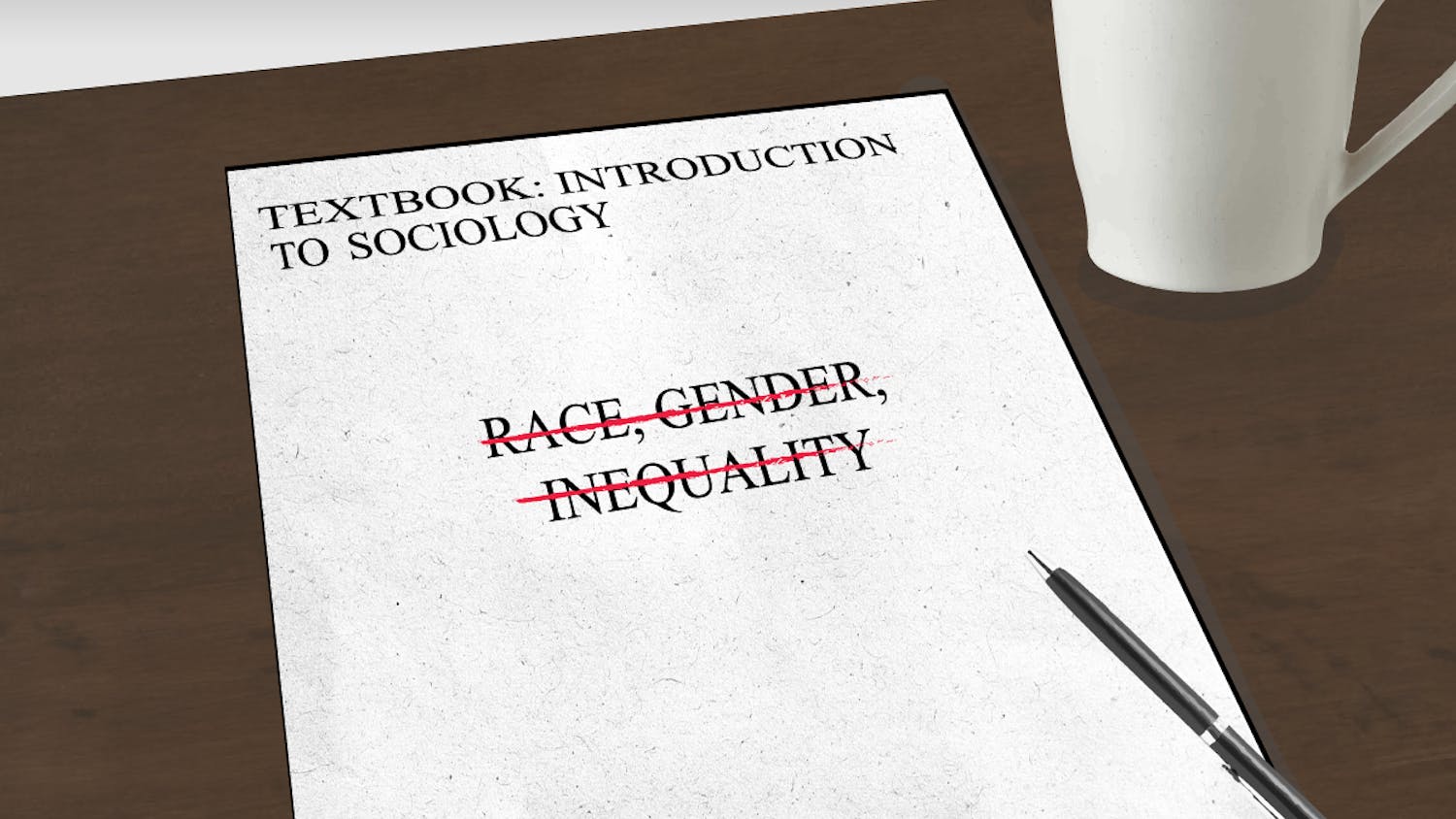Seven months after Gov. Ron DeSantis praised the United States Supreme Court’s ruling to end college admissions based on race or ethnicity, his latest executive order launched accusations that he’s passing the type of legislation he criticized.
DeSantis announced in his State of the State address Jan. 9 Florida universities will waive certain transfer requirements, including credit hours and application deadlines, for out-of-state students experiencing antisemitism or other religious discrimination on their campuses.
The executive order, signed by Florida’s state university system chancellor, cites a survey indicating 73% of Jewish college students have witnessed some form of antisemitism since the beginning of the 2023-2024 school year.
DeSantis introduced the order by pointing out Florida’s continued support of Israel since the Israel-Hamas war began Oct. 7. The state stood up to protect students at Jewish day schools and on university campuses against threats of violence, but many universities outside Florida have failed to do the same, he said.
While many Jewish Floridians praised the order, which welcomes any undergraduate students seeking to transfer to a Florida university because of a “well-founded fear of antisemitic or other religious discrimination,” others are calling it a problematic form of affirmative action.
Affirmative action, defined by the Florida Board of Governors as preferences in the university admissions process on the basis of race, color, national origin, disability or sex, has been banned in Florida since 1999. The U.S. Supreme Court made headlines in July when it rejected the practice nationwide.
“There’s no question it’s affirmative action”
Danaya Wright, a UF constitutional law professor and the Faculty Senate chair, believes the law is clearly a form of affirmative action. The question is whether this particular form of affirmative action is “suspect” or “non-suspect,” she said.
The Supreme Court ruled against categorizing students based on race, but universities can still use affirmative-action-style admissions to give preference to students in other categories — for example, legacy students with alumni parents, she said.
“There's no question it's affirmative action,” she said. “We don't allow affirmative action on the basis of race, we do allow it on the basis of legacy. Where should this fall in that sort of spectrum? If it's closer to race, then I say not OK.”
If the law is challenged, courts will navigate uncharted territory as they decide for the first time whether religion should be accepted as a justification for affirmative action, she said.
Giving Jewish students special privileges in admissions becomes a problem under the Equal Protection Clause, which says any law that makes a distinction between two groups of people has to accomplish a justified goal, she said.
DeSantis’ order can technically apply to anyone experiencing religious persecution, not just Jewish students. But the order’s stated goal of protecting Jewish students complicates its legality, she said.
“The language of the order is a little bit broader to try to make it okay,” she said. “But his saying that this is for Jewish students … that it's really just to deal with antisemitism, that then does become, I think, really problematic.”
“The analogy to affirmative action is a poor one”
UF law professor John Stinneford disagrees the law discriminates on the basis of race or religion.
The Hamilton Center senior fellow said the law’s inclusive language makes its benefits applicable to all students and doesn’t create discriminatory categories in the admissions process.
“A Muslim student facing threats based on her Islamic faith would also appear to be eligible for these benefits,” Stinneford wrote in an email to The Alligator.
Tracey Maclin, another UF law professor, agrees labeling the order as affirmative action is a faulty comparison.
Like Wright, Maclin pointed out the continued use of affirmative action in admissions based on classifications like family ties and athletic ability. But those classifications aren’t illegal or unconstitutional, he said — and neither is waiving requirements based on religion.
“What the Supreme Court has said is that schools and universities cannot make admission decisions on the basis of race or ethnicity,” he said. “This is not that.”
Nothing from the order jumps out at Maclin as violating the First or 14th amendments, including the Equal Protection Clause, he said
“I don’t see anything unconstitutional about this,” he said. “The analogy to affirmative action is a poor one.”
UF Jewish community ready to welcome transfers
Aaron Fintz, a 20-year-old UF business administration junior and the vice president of the Jewish Student Union, thinks the order is a very good thing, he said.
Fintz has seen disturbing antisemitism from universities in other states, especially among Ivy League schools, over the past months. He’s grateful to attend UF, where he feels comfortable wearing his Star of David necklace and hanging a mezuzah on his door, he said.
After spending two months last summer interning in Israel, watching his “home away from home” be torn to pieces has been hard, he said. But the university’s large, supportive Jewish population makes its campus one of the best places to be a Jewish student even in challenging times, he said.
Any Jewish students transferring from out of state will find support at UF, he said — whether by attending services at the university’s two temples or joining groups like UF Hillel.
“You will feel very safe,” he said. “We still want to be careful because it is such a big university and it just takes one person to make a comment or misjudge you. I would say if you focus on who you're surrounding yourself with, you should have a very easy time making that transition.”
UF President Ben Sasse and the university administration have made it clear that antisemitism has no place at UF, said Jonah Zinn, the executive director of UF Hillel, in a statement to The Alligator. That commitment is part of what has distinguished UF over the past months as a supportive campus environment for Jewish students, he wrote.
“We look forward to welcoming any students who are looking to engage with Jewish life on campus,” he wrote. “We are fortunate that UF is a place where Jewish students know they belong and are valued."
UF transfer students typically need at least 60 transferable semester credit hours and competency in a foreign language to apply.
The foreign language competency requirement and the state’s definition of a transfer student as “students who have earned twelve or more semester hours of transferable college credit since receiving a standard high school diploma” are waived under the order.
The order also offers tuition and fee waivers to students experiencing financial hardship and waives application date deadlines — but not enrollment deadlines — for transfers.
Waiving application deadlines will be helpful for out-of-state students navigating the transfer process, said Brittney Gianantonio, a 24-year-old UF education sciences senior and president of Tau Sigma, the national transfer student fraternity.
“I think if I was in a situation that they are, where they're not feeling safe on campus currently … it could be helpful,” she said. “Sometimes you miss a deadline because there's just so much going on. So I do think it can be really beneficial.”
When she transferred to UF in 2019, the university did a good job making her feel welcome among its existing student population, she said. Getting into the groove was difficult initially, but from participating in transfer student welcome week to joining Tau Sigma, she’s found a great connection to the campus, she said.
The university is similarly accomplished in welcoming its Jewish students and has done the best it can in supporting his community over the past couple of months, Fintz said.
UF makes a point of giving everyone a voice — Fintz appreciates that he can table for Jewish organizations in Turlington Plaza right next to the table for Islam on Campus, he said. At the end of the day, he just wants everyone to respect each others’ points of view, he said.
“I feel like you have to stay informed and realize that you’ve got to pray for everyone,” he said. “And just be happy that we're in a place that we feel comfortable.”
The order went into effect immediately Jan. 9. UF has not yet responded for comment on how it will carry out the “expedited review” process of transfer students.
Contact Zoey Thomas at zthomas@alligator.org. Follow her on X @zoeythomas39.

Zoey Thomas is a UF media production senior and the Spring 2026 editor-in-chief of The Alligator. She has previously been data editor and engagement managing editor, as well as a reporter for three semesters. She was also a intern at the Orlando Sentinel. In her sparse free time, Zoey enjoys reading a good book, going for a run or waking up her roommates with the sound of her espresso machine.






